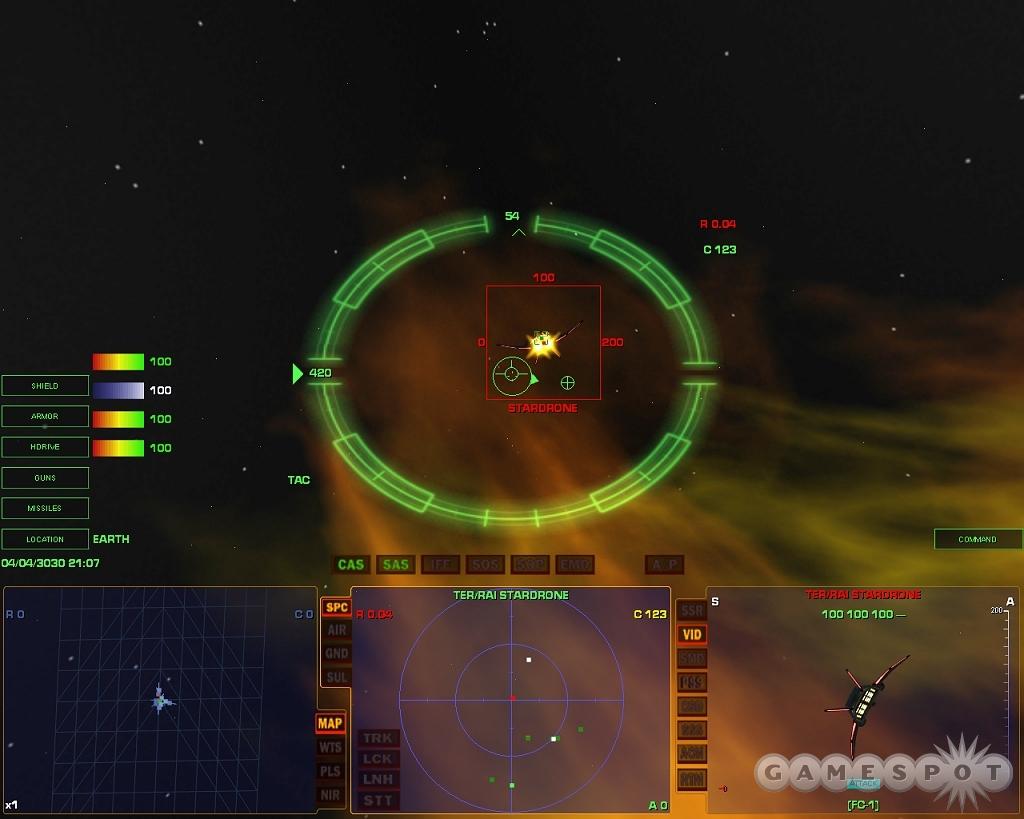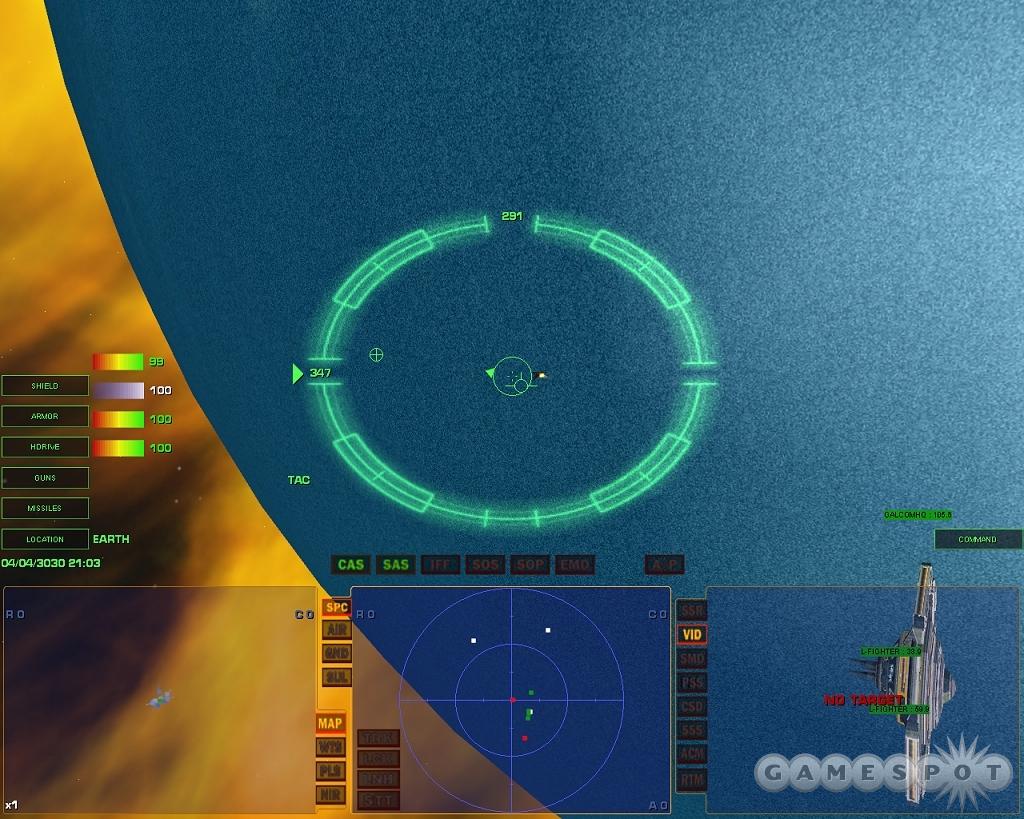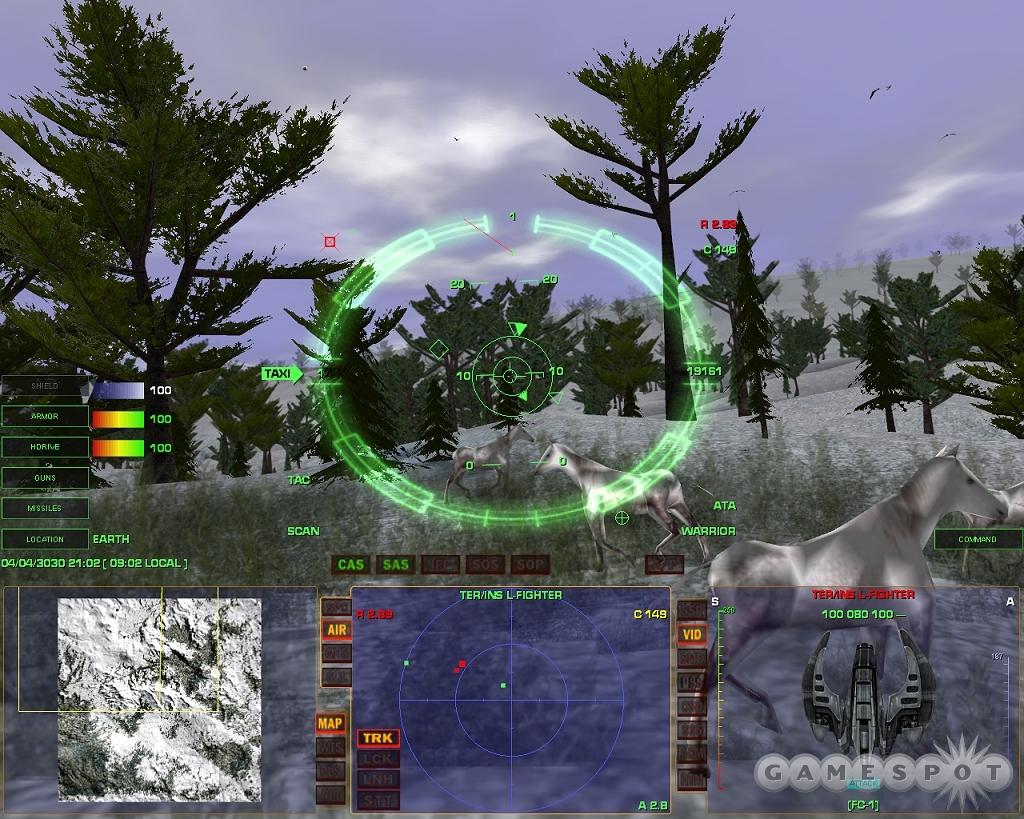Controversy is an undocumented feature in games designed by outspoken developer Derek Smart, whose previous work includes the Battlecruiser series of space simulations. So perhaps it's no surprise that his latest effort, an expanded and updated take on the Battlecruiser universe called Universal Combat (which began life as Battlecruiser Generations), was the subject of litigation due to publisher DreamCatcher Interactive's last-minute decision to ship the game as a $19.99 budget release. Unfortunately, Universal Combat probably just isn't worth all the hassle. Much like its predecessor, Battlecruiser Millennium, this wildly ambitious simulation is torpedoed by an almost incomprehensible interface, the absence of a tutorial both in-game and in the poorly organized manual, numerous bugs, and many fit and finish issues, including dated production values. While it may contain incredible depth and a range of activities that let you wage war in almost every conceivable fashion, all of these features are inaccessible unless you have hundreds of hours available to figure everything out, and even then, the quality of these elements is uniformly lacking. This is the Rosetta Stone of computer gaming.

However, the game does mostly live up to all the prerelease hype, at least where features are concerned. The universe is absolutely massive. There are hundreds of worlds to explore, thousands of ships and starbases, a dozen playable races, and career and caste options that let you play as every sort of character from the standard ship commander to such esoteric specialties as marines and medics. You can fight among the stars in immense battlecruisers, and you can fight on planet surfaces or in planes. Ship-to-ship naval combat, as seen on the box, apparently didn't make the cut, although you can battle on and around sea vessels. Game modes include a 25-mission solo campaign, a sandbox roam option, instant action scenarios, and even a multiplayer selection. If you've played any of the previous Battlecruiser releases, you'll immediately recognize many elements of play, along with the tremendous scope of this design.
You'll also immediately recognize many familiar problems. Universal Combat is more of a demo than a completed product. You can catch glimpses of real depth on occasion, though you have to play for many hours to find these highlights, and you must often play for much longer to fully understand what you lucked into during the first go-round. The biggest problem is the lack of tutorials. No step-by-step guidance is provided in the game or in the manual, although you can download a 44-page PDF tutorial for the demo. The latter does contain a lot of information (scattered over nearly a hundred pages), although the organization is slipshod, and there is no index. As a result, you can't look up basic terms or skip around to answer questions as they arise while playing. The in-game description of the roam mode is fitting for the game, as a whole, in that you're really abandoned with "no hints, no tips, no directions, and certainly no instructions as to what you can and cannot do."
And if any game needed interactive tutorials and thorough documentation, it's this one. The interface remains ridiculously obtuse, which is hard to understand considering that Smart and his 3000AD development company have been working on this series for almost a decade now. Three pages of dense type are required to spell out all of the game commands. Few of these commands are intuitive, and there is no way to remap keys. Even quitting the game requires hitting "Alt-Q" rather than the usual "Esc." Mastery of ship interfaces requires both an intimate knowledge of hotkeys and nested menus. You also have to memorize the meanings of at least a hundred acronyms that represent vital ship systems. You can't go too far, for example, without understanding that activating the EMD will disable the NIS, TRS, and VDD. Only the first-person interface is remotely straightforward.

Yet not everything about Universal Combat involves drudgery. There is more of a focus on battle this time out. Provided that you can get over the initial interface learning curve, the majority of missions prove to be more action-packed than those in Battlecruiser Millennium. You are typically thrust right into the fray, particularly in the instant-action scenarios, where you're either defending against an enemy attack or leading an offensive. For instance, a mysterious weapon is en route to galactic command, an opposing alien fleet must be attacked as it retreats, an aerial strike force flies a sortie against an enemy base, a strike team of marines takes out an enemy gunship on a planet surface, a wing of fighters engages in a dogfight, and other scenarios will be encountered.
Similar missions await you in the campaign setting, and you can find just about whatever you want in roam mode. Combat is frequent, although you don't spend nearly as much time engaged in battle as you do exploring space or simply going from point A to point B. The biggest issue here is the absence of time compression. There is no way to speed up the tedious stretches when you're in transit. So heading down to a planet from orbit takes at least five minutes of real time. Catching up with enemy vessels often takes at least that long. Running across a compound to attack enemy soldiers can stretch into what seems to be a marathon. Consider keeping reading material close-by when playing Universal Combat.

Gameplay, overall, is also spread far too thin. Not only does the immense scope of the design cause big problems with accessibility, but it makes each of the battle options feel watered-down. You get the impression that 3000AD should have continued to perfect space combat before venturing too far on to planets. Everything on terra firma is particularly weak. First-person controls are sluggish, and there is an almost complete absence of collision detection. You can walk or drive vehicles right through terrain features, such as trees. Space and aerial combat is better realized, although even it doesn't feel quite right. Mouse control seems soft and inexact. All craft in the game, even massive battlecruisers, handle more like fighters than capital ships. Because of this, ship-to-ship combat gets repetitive. Matters aren't helped any by an emphasis on circling and strafing during engagements. Opponents are out of visual range much of the time, since they prefer to dart back and forth while sniping at you. This may be realistic, and it may even be testimony to some impressive enemy artificial intelligence, but it isn't exactly thrilling.
At least Internet multiplayer support has been added. Roam and skirmish (deathmatch) modes of play are supported. However, very few people appear to be taking advantage of these options. Over the course of a week's worth of attempts, we found an active server just one time, running a roam game. Unfortunately, it didn't have anyone actually on it, and performance was very erratic. We experienced a ship system failure and explosion for no apparent reason immediately after entering one game, along with a couple of crashes to the desktop, and one hard system reset after returning to the server. At any rate, roam play online seems virtually identical to roam play offline. There is some potential here, however, as long as you coordinate with fellow players before starting a game. It seems impossible to get a satisfying multiplayer game going without this sort of planning, since the universe is so large.
Further barriers to enjoying Universal Combat are presented by shoddy production values and quality control. Visuals are a good four years out-of-date. Planets look like Day-Glo pancakes. Ship design remains varied and impressive, from an industrial design standpoint, but the absence of shadowing effects makes them look blocky and fake. Planet surfaces are either barren, or they're jammed with just one or two types of foliage. Audio quality is at a similar level. There is a lot of dialogue repetition, especially during first-person ground combat, and the background noise on your starship is such a cacophony of voices that you'll soon reach for the mute button. The bombastic musical themes are gratingly repetitive as well.

Stability is another serious concern. Like its predecessor, this game doesn't seem all there. The frame rate regularly pauses in solo play, with hitches that are reminiscent of online lag--especially on planet surfaces. Menu screens occasionally flicker, as do backgrounds like skies on planets. Drops to the desktop occur on an infrequent basis (particularly when in first-person mode on a planet), and, of course, there is also that collision detection problem noted previously. The game feels like it was rushed out the door. Additional evidence of this may be seen in the way that the initial-loading splash screen still features the long-abandoned Battlecruiser Generations title and logo. Furthermore, the first pressing of CDs strangely lacks the autorun file needed for the opening menu to automatically launch. These latter items are minor, in light of the bugs, though they do point to a certain lack of polish.
At its heart, Universal Combat is yet another somewhat noble failure. Much like its predecessors, it tries too hard to do too much and winds up falling short in almost every area. There remains great promise in the core concept--and in many aspects of the design--but even the most dedicated followers of Derek Smart and 3000AD must be wondering (by now) if this promise is ever going to be fulfilled.